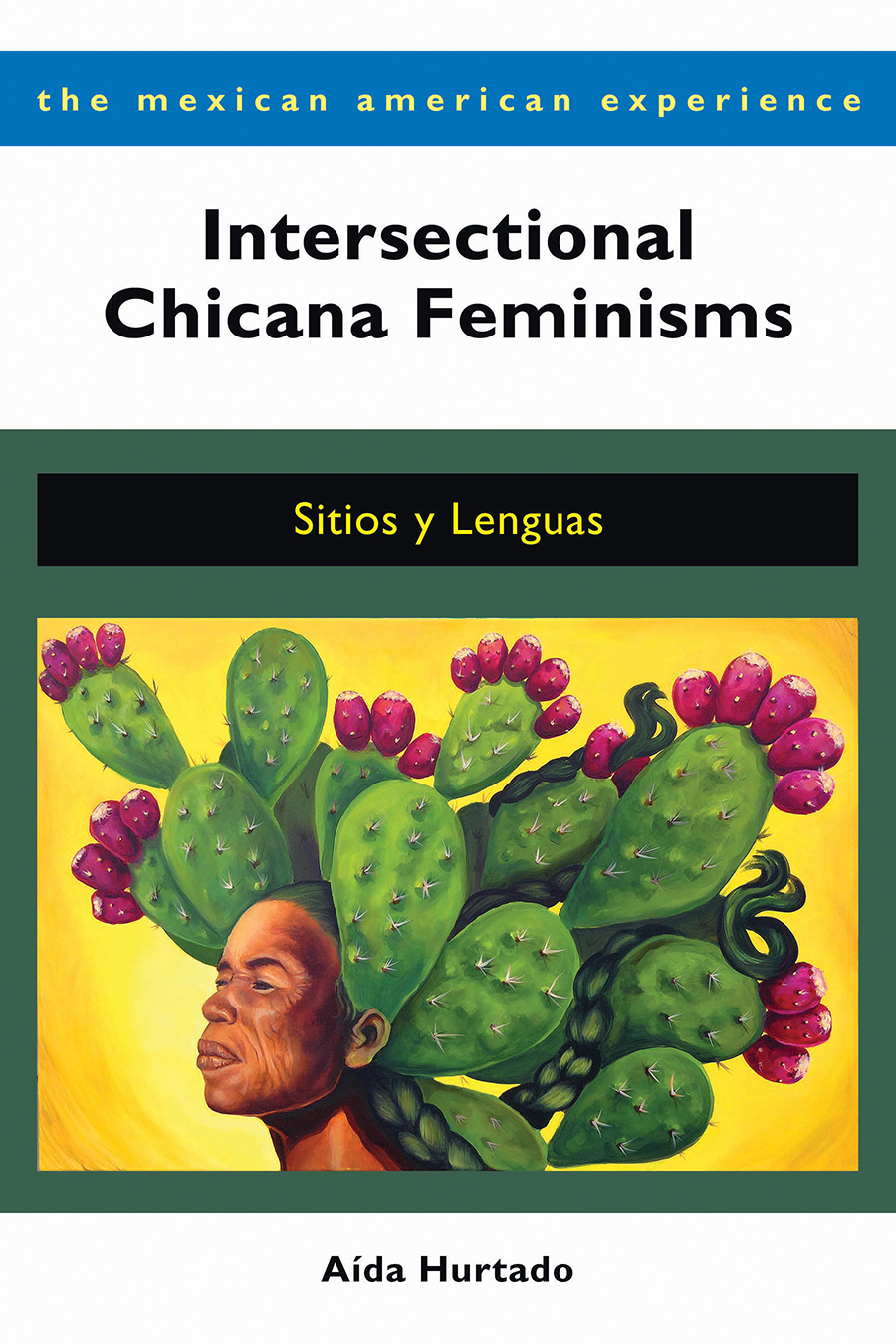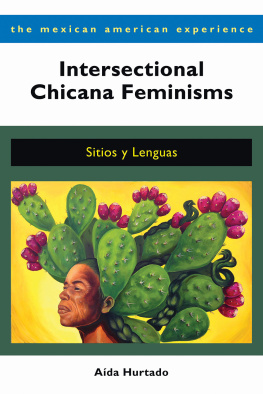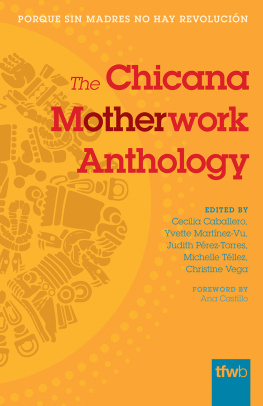
Intersectional Chicana Feminisms
THE MEXICAN AMERICAN EXPERIENCE
Adela de la Torre, Editor
The Mexican American Experience is a cluster of modular texts designed to provide greater flexibility in undergraduate education. Each book deals with a single topic concerning the Mexican American population. Instructors can create a semester-long course from any combination of volumes, or may choose to use one or two volumes to complement other texts. For more information, please visit http://www.uapress.arizona.edu/textbooks/latino.htm.
Other books in the series:
Mexican Americans and Health, by Adela de la Torre and Antonio Estrada
Chicano Popular Culture, by Charles M. Tatum
Mexican Americans and the U.S. Economy, by Arturo Gonzlez
Mexican Americans and the Law, by Reynaldo Anaya Valencia, Sonia R. Garca, Henry Flores, and Jos Roberto Jurez Jr.
Chicana/o Identity in a Changing U.S. Society, by Ada Hurtado and Patricia Gurin
Mexican Americans and the Environment, by Devon G. Pea
Mexican Americans and the Politics of Diversity, by Lisa Magaa
Mexican Americans and Language, by Glenn A. Martnez
Chicano and Chicana Literature, by Charles M. Tatum
Chicana and Chicano Art, by Carlos Francisco Jackson
Immigration Law and the U.S.-Mexico Border, by Kevin R. Johnson and Bernard Trujillo
Chicana and Chicano Mental Health, by Yvette G. Flores
Mexican Americans and Education, by Estela Godinez Balln
Intersectional Chicana Feminisms
Sitios y Lenguas
Ada Hurtado

The University of Arizona Press
www.uapress.arizona.edu
2020 by The Arizona Board of Regents
All rights reserved. Published 2020
ISBN-13: 978-0-8165-3761-7 (paper)
Cover design by Leigh McDonald
Cover art: La Nopalera by Irene Jurez OConnell
Typset by Sara Thaxton in Granjon LT Std and Gill Sans MT Std
Library of Congress Cataloging-in-Publication Data are available at https://lccn.loc.gov/2019036754.
Printed in the United States of America
This paper meets the requirements of ANSI/NISO Z39.48-1992 (Permanence of Paper).
Dedico este libro a las siguientes mujeres:
Gloria E. Anzalda
Martha Cotera
Norma E. Cant
Alicia Gaspar de Alba
These are the women who have carried the field of Chicana feminisms on the back of their plumas. Escribiendo, always escribiendo against all oddswhether there are children to raise, biological or not, familia to support, or brothers who have died. When no one thinks that what they write is of worth, deep into the nightdouble duty, triple dutybecause no one will get less from them than their very best. Estas son las soldaderas, pistoleras, women warriors, fierce women, who never give up, who dispense love, support, and wisdom instead of bullets, and, above all, who write, always write.
Y para las mujeres pistoleras del Valle de Tejas que luchan todos los dias against the wall, against child-family separations, who feed the minds of the young ones, who write about the Valley with urgency, who organize picket lines, and who above all love the Valley y su gente. I name only a few: Stephanie Alvarez,
Contents
Illustrations
Acknowledgments
Finishing a book entails many magical connections. Some are by design and others are like Russian dollsone opens up a connection and many others follow. I have been lucky to have many fortuitous associations that have guided me down the path of writing this book. Of particular significance is my good fortune of spending most of my professional career at the University of California, Santa Cruz (UCSC). I was hired as an assistant professor and left the campus as a full professor to join the University of California, Santa Barbara (UCSB)just far enough that I could still manage to commute from Santa Cruz to Santa Barbara on a weekly basis but not so far as to make it impossible for me to become part of the Department of Chicana and Chicano Studies at UCSB. I have been blessed to have had magnificent professional and personal connections on both campuses.
I began my career at UCSC after I finished graduate school at the University of Michigan. UCSC put me in touch with a community of feminists on and off campus that nurtured my feminist consciousness at a young age when I was beginning my journey as a writer. Among the many faculty members who guided me to become a feminist were Bettina Aptheker, Helene Moglen, Candace West, and Valerie Simmons. There were also community members, UCSC graduate students, and staff who were critical to increasing my gender consciousnessfolks like Ciel Benedetto, Sophia Garca, Beatrz Lpez Flores, Rosie Cabrera, and Hale Bolak, among many others. The UCSC Chicano/Latino Research Center provided the intellectual home for the Chicana Feminist Research Cluster that worked collaboratively for ten years and produced the Chicana Feminist Colloquium Series covered in of this book and the edited volume A Critical Reader: Chicana Feminisms, published by Duke University Press in 2003. The core members of the research cluster were Professors Gabriela Arredondo, Norma Klahn, Olga Njera Ramrez, and Patricia Zavella. Estas mujeres fueron fuente de inspiracin, a source of intellectual growth and mentorshipsin ellas, my accomplishments would be minimal.
UCSC also allowed me to have the intellectual and physical space to mentor and train a long line of undergraduate research assistants who worked with me on a daily basis. The research assistants youthful eagerness to learn, insightful questioning, and companionship helped create a community of collaborators, many of whom have moved on to build careers of their ownamong them are Virginia Espino, Francie Cordova, Christina Santana, and Mindy Nabor. For this book I extend my deepest gratitude to undergraduate research assistants Luz Estrada, Xarah Golden, and Xochitl Avitia. In particular, Id like to thank research assistants Chieun (Gloria) Kim and Iliana Aldanaboth brilliant young scholars whose skills, dedication, and enthusiasm for research makes me feel blessed to have chosen this profession.
My graduate students, past and present, were also part of our collaborative research lab at UCSC. Graduate students Karina Cervantez and Aracely Garcia and former graduate students (now colegas) Jessica Lpez Lyman and Ruby Hernndez will always be an integral part of my work.
In Santa Cruz I also met my editor of many years, Kim Loretucci. Her superb editing skills and deep reading of my work established a connection that I cherish and that thankfully turned into friendship.
My connection to Adela de la Torre, the editor of the Mexican American Experience series and the first Latina to serve as the president of San Diego State University, formed many years ago when we were both graduate students attending the various meetings of the National Association of Chicana and Chicano Studies. Adelas brilliant idea of creating an accessible book series was prescient, now that these modular volumes can be used to teach Chicana and Chicano studies in K12. Im deeply grateful for her vision and dedication to creating avenues for the dispersion of our discipline.
My sincerest appreciation to the University of Arizona Press staff and to the anonymous reviewers, whose close reading of the manuscript made it so much better.
Next page




